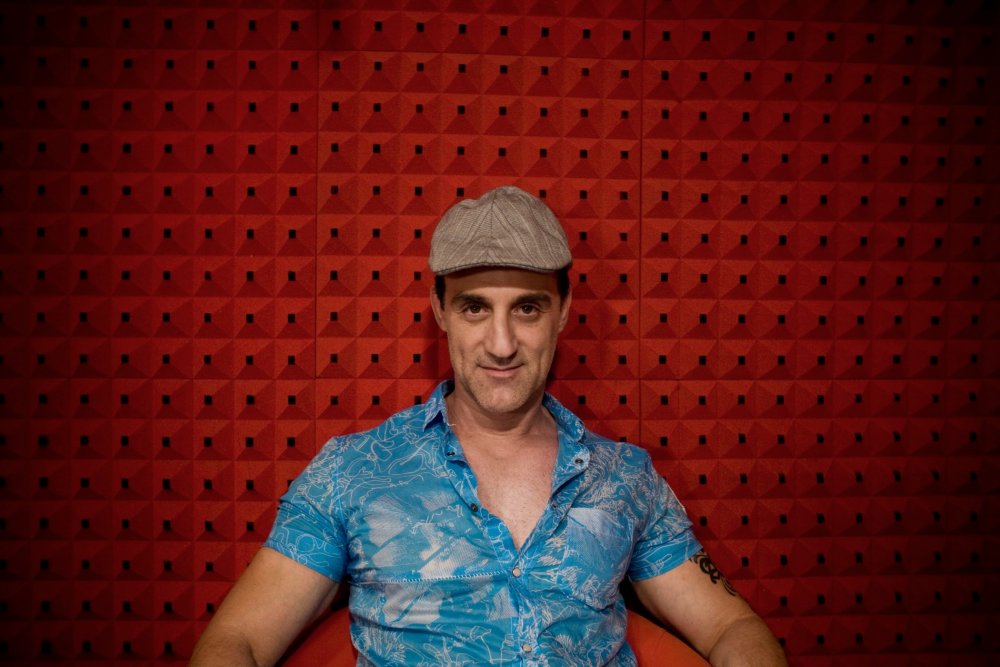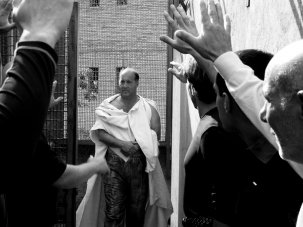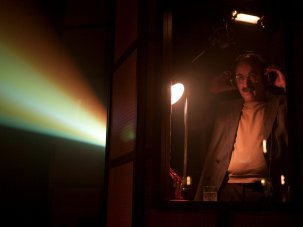Last year saw the festival premieres of no fewer than three Italian films featuring real-life prison inmates. Vincenzo Marra’s documentary The Triplet focuses on the life of a charismatic prisoner, while Caesar Must Die by the Taviani brothers sees a group of inmates staging a production of Shakespeare’s Julius Caesar. Matteo Garrone’s Cannes Grand Prix-winning Reality takes place outside a prison context but stars convicted camorrista Aniello Arena as a fishmonger obsessed with appearing on Grande Fratello, the Italian version of Big Brother.
Italy/France 2012
Certificate 15 116m 25s
Director Matteo Garrone
Cast
Luciano Aniello Arena
Maria Loredana Simioli
Michele Nando Paone
aunt Nunzia Nunzia Schiano
Giusy Giuseppina Cervizzi
Massimone Nello Iorio
Uncle Pasquale Carlo Del Sorbo
Aunt Rosaria Rosaria D’Urso
Luciano’s mother Graziella Marina
Alessandra Alessandra Scognamillo
Martina Martina Graziuso
Vincenzo Vincenzo Riccio
presenter Claudia Gerini
[2.35:1]
Subtitles
Distributor Independent Distribution
Reality heralds a marked, deliberate shift in tone after Gomorrah (2008), the Rome-born director’s uncompromising fresco of Neapolitan criminality. As with the earlier film, he doesn’t flinch from depicting the realities of Naples’s lower classes, but Gomorrah’s bleak, hard-edged starkness is replaced by a softer, more humanist approach. While Gomorrah’s Italian antecedents include the works of Francesco Rosi and Elio Petri, those of Reality might be found among the films of Vittorio De Sica or Pietro Germi.
The clearest links, however, are with two pictures made in the early 1950s: Luchino Visconti’s Bellissima and Federico Fellini’s The White Sheik, which both deal affectionately with characters swept away by the allure of celebrity. The latter – Fellini’s solo debut – is the tale of a young newlywed couple who arrive in Rome for their honeymoon only for the wife, Wanda (Brunella Bovo), to go in search of the hero of her favourite fotoromanzo stories. There is a line in The White Sheik that seems to foreshadow perfectly events in Garrone’s new film: near the end of the picture, a tearful Wanda says, “Our real life is in our dreams, but sometimes dreams are a fatal abyss.”
Reality opens with a sequence shot floating high over the skies of Naples. The camera slowly closes in on a horse-drawn carriage as it makes its way to a lavish hotel complex. There is a feeling of dreamlike weightlessness to the camera movement as we’re carried through the air by a swirling wind that’s straight out of Fellini.
The sound of the wind segues into the fairytale tinkle of the main theme from composer Alexandre Desplat (remarkably, Reality represents less than an eighth of Desplat’s 2012 output – other scores include Wes Anderson’s Moonrise Kingdom, Jacques Audiard’s Rust and Bone, Ben Affleck’s Argo and Kathryn Bigelow’s Zero Dark Thirty). His score perfectly captures a sense of enchantment and wonder – think the lighter side of Danny Elfman with the added understated synths of Teho Teardo.
Both this first shot and the one that follows set out Garrone’s formal approach, the director privileging mobile, loose sequence shots, whether moving among a group of characters or focusing in on Arena. It’s a fluid approach that clearly gets the best out of his actors, especially his lead protagonist.
As Luciano Ciotola, the exuberant fishmonger seduced by the prospect of fame and fortune, the 44-year-old Neapolitan is superb. Garrone insisted on casting Arena because he was convinced that no mainstream Italian actor of stage or screen had the right physiognomy or experience for the role. (The director had originally wanted him to appear in Gomorrah but the authorities refused permission on the grounds that the film’s subject-matter was a little too close to Arena’s real-life criminal past.) However, Arena’s performance in Reality is all the better for being the delayed debut that it is – Luciano’s wide-eyed, childlike sense of wonder is clearly that of Arena himself, finally allowed to step on to a film set for the first time.
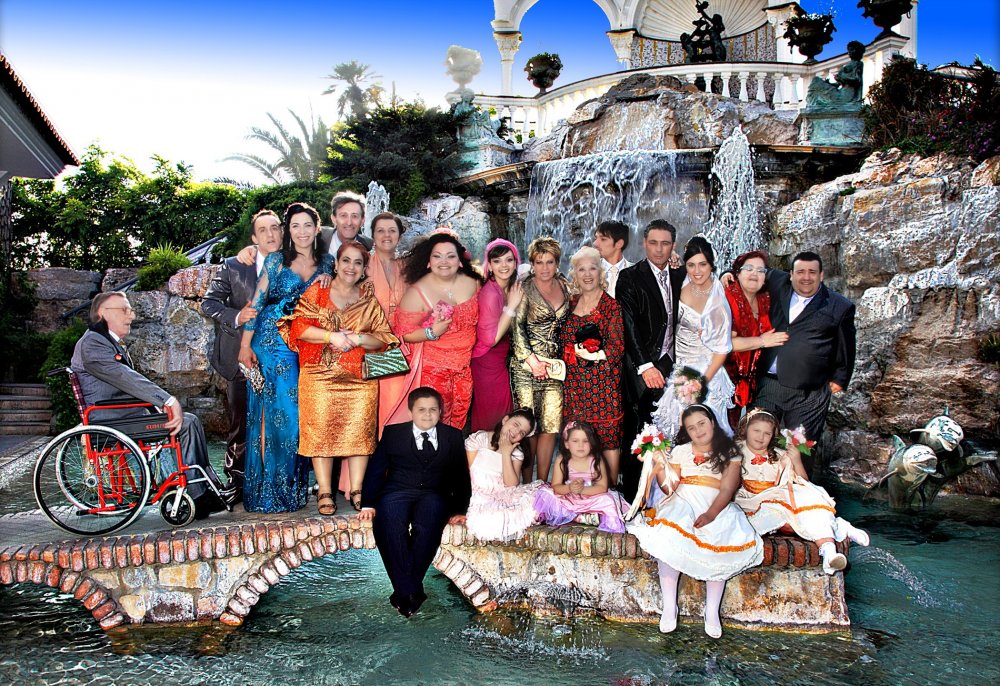
The members of the supporting cast, taken mostly from regional and national theatre, are exceptional, especially Loredana Simoli as Luciano’s wife Maria and Giuseppina Cervizzi as Giusy, his excitable niece and most fervent supporter. Nando Paone’s dignified, dependable cousin Michele is very much the straight man, pouring cold water whenever possible on Luciano’s fiery flamboyance. If any character slips into caricature, it’s that of former Big Brother housemate Enzo (Raffaele Ferrante). Self-satisfied and patronising, with a straw pork-pie hat to mask his bald patch, he never misses an opportunity to blurt out his catchphrase: “Nevah-geeve-ap!” The film also features a terrific cameo from Ciro Petrone – who played one of the teenage gangsters in Gomorrah – as the barista in Luciano’s local café.
Gomorrah was concerned not with the people at the top but with those scrambling to survive on the ground, and the same is true of Reality. Garrone’s new film doesn’t venture down the well-trodden path of critiquing the phenomenon of reality TV. What interests the director far more is the impact of such shows on an individual psyche. “I’ve never had a goal in life,” Luciano admits to Maria, “but since I got this thing [the Big Brother call], my head’s spinning.” This line comes during a quietly masterful sequence in which Luciano arrives outside Maria’s workplace one evening; in a three-minute take we follow the couple from behind as Luciano pleads with his wife to support his decision to sell his fish stall on the basis that his appearance on Big Brother will assure their future. It’s a step that proves disastrous, since Luciano goes no further than the second audition.
Through camera movement and mise en scène, Garrone shows how the clouds slowly start to gather in his protagonist’s mind. Later, when the Ciotolas come together in Luciano’s apartment to watch the series opener of Big Brother, the camera pans slowly around the dimly lit room, taking in the expensive new TV and the nervous family before settling on Luciano, brooding in almost complete darkness. Garrone – who has a distinguished background as a painter – has always excelled in the quasi-expressionist use of light, shadow and colour (notably in 2002’s The Embalmer, though there’s also the disarming neon in the opening moments of Gomorrah). Painterly compositions abound in Reality too – when the family return home after a wedding celebration, the muted, decaying tones of their apartment block (both interior and exterior) contrast sharply with the ‘Big Fat Neapolitan Wedding’ kitsch of the preceding scenes.
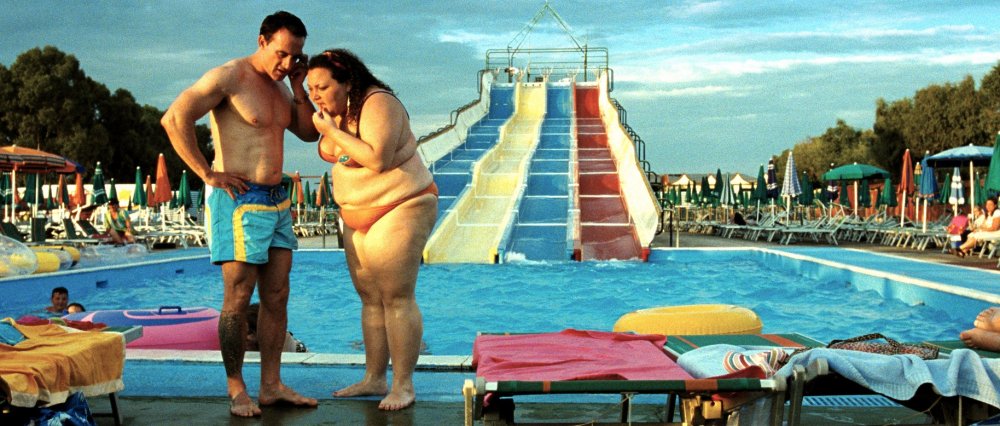
Once the first episode of Big Brother is aired, most members of the family resign themselves to the fact that Luciano isn’t going to be part of the show. Luciano, however, rather than letting go of his ambition, becomes even more obsessed with it, and the final third of the film is concerned – like Peter Strickland’s recent Berberian Sound Studio – with the protagonist’s psychological unravelling. In one scene, Luciano becomes fixated on a cricket perched high on a cornice in his living room.
In another – echoing Nicolas Roeg’s Don’t Look Now – he meets two mysterious women at a cemetery and asks them what else he has to do to be called up by Big Brother. His questions, rather than meeting with surprise or bewilderment, are answered with an eerie calm. “Be patient,” says one of the women, “only death has no remedy, everything else works out.” Garrone is undoubtedly sensitive to Luciano’s drama but he never loses sight of its (often uncomfortable) comic aspect. Indeed, just when his protagonist seems to have turned the corner, his wife finds him singing to himself in a self-made Big Brother diary room.
Garrone shot Reality in sequence and considered several endings, from the positive to the downright tragic. Given the director’s clear affection for his protagonist, the oneiric ambiguity of the chosen finale should come as no surprise. Rather than a cop-out, it’s very much in keeping with the tone of the film as a whole. Wisely going beyond tired arguments over Big Brother and reality TV, Reality works both as a modern fairytale and as a very welcome contemporary take on the commedia all’italiana.
-
Sight & Sound: the April 2013 issue

In this issue: Danny Boyle, Kristin Scott Thomas, Carlos Reygadas, Point Blank and Beyond the Hills.
-
The Digital Edition and Archive quick link
Log in here to your digital edition and archive subscription, take a look at the packages on offer and buy a subscription.




